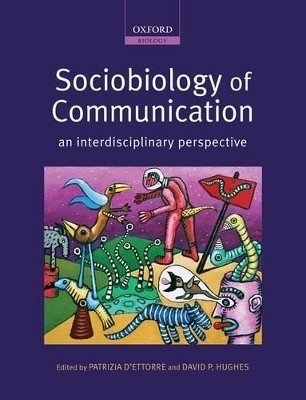
Sociobiology of Communication
Oxford University Press (Verlag)
978-0-19-921684-0 (ISBN)
Communication is essential for all forms of social interaction, from parental care to mate choice and cooperation. This is evident for human societies but less obvious for bacterial biofilms, ant colonies or flocks of birds. The major disciplines of communication research have tried to identify common core principles, but syntheses have been few because historical barriers have limited interaction between different research fields.
Sociobiology of Communication is a timely and novel synthesis. It bridges many of the gaps between proximate and ultimate levels of analysis, between empirical model systems, and between biology and the humanities. The book offers the complementary approaches of a distinguished group of authors spanning a large diversity of research programs, addressing, for example, the genetic basis of bacterial communication, dishonest communication in insect societies, sexual selection and network communication among colonial vertebrates. Other chapters explore the role of communication in genomic conflict and self-organisation, and how linguistics, psychology and philosophy may ultimately contribute to a biological understanding of human mate choice and the evolution of human societies.
This highly interdisciplinary book highlights key examples of modern research to explore the genetic, neurobiological, physiological, chemical and behavioural basis of social communication. It identifies where consensus on the general principles is emerging and where the major future challenges are to be found. The book is therefore suitable for both for graduate students and professionals in evolutionary biology and behavioural ecology seeking novel inspiration, and for a wider academic audience, including social and medical scientists who would like to explore what evolutionary approaches can offer to their fields.
Associate Professor Patrizia d'Ettorre is at the Centre for Social Evolution, University of Copenhagen. Here she is the leader of a Marie Curie Excellence team that studies the evolutionary basis of chemical communication and recognition in insect societies. Her background is in evolutionary biology and the resolution of conflict within societies. Her personal interest in communication is not restricted to social insects, she is expanding her expertise in the evolutionary biology of chemical communication into various interfaces with other relevant disciplines using a variety of model organisms (from insects to humans). Prior to her current position she was a post-doc at the university of Regensburg in Germany and at the University of Tours in France. She received her PhD from the University of Parma, Italy, in 1996. Dr David P. Hughes is a Marie Curie research fellow at the Centre for Social Evolution, University of Copenhagen. He is interested in the manipulation of social insects by parasites, the evolution of virulence in social insects and organismal biology of parasites in social insect hosts. Before his current position he held a postdoctoral position in Oulu, Finland. He received his PhD from Oxford in 2003.
Foreword ; 1. The Handicap Principle and Signalling in Collaborative Systems ; 2. Communication in Bacteria ; 3. Communication in Social Networks of Territorial Animals: Networking at Different Levels in Birds and Other Systems ; 4. Communication between Hosts and Social Parasites ; 5. Chemical Communication and the Coordination of Social Interactions in Insects ; 6. Chemical Communication in Societies of Rodents ; 7. Neurobiology of Olfactory Communication in the Honeybee ; 8. Rapid Evolution and Sexual Signals ; 9. Communication of Mate Quality in Humans ; 10. The Extended Phenotype within the Colony and how it Obscurers Social Communication ; 11. Synergy in Social Communication ; 12. Conflicting Messages: Genomic Imprinting and Internal Communication ; 13. Language Unbound:Genomic Imprinting and Psychosis in the Origin and Evolution of Modern Humans ; 14. The Evolution of Human Communication and Language ; 15. Why Teach? The Evolutionary Origins and Ecological Consequences of Costly Information Transfer ; 16. Grades of Signalling ; 17. Conclusion ; Glossary
| Erscheint lt. Verlag | 31.8.2008 |
|---|---|
| Zusatzinfo | 40 line and 10 halftone illustrations |
| Verlagsort | Oxford |
| Sprache | englisch |
| Maße | 190 x 246 mm |
| Gewicht | 709 g |
| Themenwelt | Geisteswissenschaften ► Sprach- / Literaturwissenschaft ► Sprachwissenschaft |
| Naturwissenschaften ► Biologie ► Evolution | |
| Naturwissenschaften ► Biologie ► Zoologie | |
| Sozialwissenschaften ► Ethnologie | |
| Sozialwissenschaften ► Soziologie | |
| ISBN-10 | 0-19-921684-3 / 0199216843 |
| ISBN-13 | 978-0-19-921684-0 / 9780199216840 |
| Zustand | Neuware |
| Haben Sie eine Frage zum Produkt? |
aus dem Bereich


